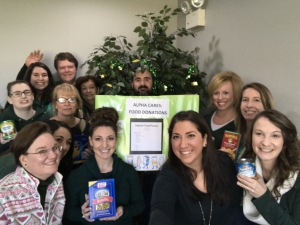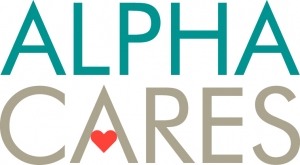In June we are spreading awareness for conserving the environment! In America, we often use many resources without thinking about the consequences. Although our country makes up less than 5 percent of the world population, we still consume over 30 percent of its resources. Also, 110 million Americans live with such high levels of air pollution that threaten their lives.
This is why it is so important that we spread awareness about the environment. Not only is the health of our planet in danger, but also our own health. Not many people are considering the impact that their actions are having on their planet and their neighbors.
This is why the Alpha Group will be hosting a Tree Planting event right here at Alpha Place! This is open to all clients, field employees, in-house employees, and the friends and families of everyone! Come join us with your shovels and garden gloves! We will be announcing the date later in the month.
There are so many things that you can change in your everyday life that will help save the environment. Even companies can make changes to their routines that are green. For a list of ways to go green and make an impact at your place of work, take a look at our list of ideas attached.
Lives You Save: Patient Stories
Your Gift...Their Life: How Patients Benefit
Every time you donate blood you help save a life. Sounds extreme?
Not to the patients whose lives have been saved through the efforts of our donors.
Brandon Levine
On January 30, 2015 Brandon received the rare opportunity to meet with 40 of the people who helped saved his life through blood donations. Brandon nearly died in a motorcycle accident on April 27th and in efforts to save him received over 200 units of blood products. During the event, Brandon was able to share his story with the donors that helped save his life and personally thank them by saying "...a part of you is inside of me and that's why I'm standing here today." Read the full story »
Related Links: UCLA Health | CBS Los Angeles | Yahoo! News |U.S. News & World Report | Daily Mail
Jennifer Calderon
Due to confidentiality laws, most blood donors never know who receives their blood. Similarly, patients never learn the identities of those who donated their time and blood to save their lives. But a rare reunion organized by the UCLA Blood and Platelet Center changed that. A young mother who nearly died from massive bleeding after giving birth to her premature son was able to meet seven blood and platelet donors who sustained her life with their generous donations.
Jennifer C. expressed her gratitude for the 24 units of donated blood, plasma and platelets that preserved her life — and allowed her sons to have their mother. Jennifer suffered uterine hemorrhaging after a high-risk cesarean section at Ronald Reagan UCLA Medical Center in April 2013. Only 5-feet tall, she lost five liters of blood — nearly her entire supply — and was hospitalized at UCLA for two weeks, with two days in intensive care.
Related Links: CBS Los Angeles, NBC Southern California, KTLA 5, UCLA Health, KHTS AM 1220, KCAL News

Jennifer Golden
Twenty-one year old college student Jennifer Golden from Las Vegas, Nevada received 24 units of blood products during her double lung and liver transplant surgery. Jennifer was diagnosed at 5 months old with cystic fibrosis, which affected her lungs and deteriorated her liver. At the time Jennifer received the transplant, her lung capacity was at 12% and she was constantly coughing and having to catch her breath. The 13 hour surgery performed at the UCLA Ronald Reagan Medical Center in 2011 was a success. During an interview, Jennifer was asked what she planned to do in the future and she answered "...I never really got a chance to think about what I wanted to do. It was always day by day. Now I can think about a future."

John-Paul Quintero
"Because of a rare form of anemia that my 3 year old son has, he needs blood transfusions every two to three weeks in order to survive.
So I urge you... make that call, make the time and donate blood. It doesn't cost a thing and it's worth more than all the money in the world - It's the gift of life and you can give it."
– Marisol Quintero
John's Mother
 Alyssa Gomez
Alyssa Gomez
"You don't know how important donating blood is until you're sick." That's what Alyssa Gomez tells people and she knows it's true. In the fall of 2004, Alyssa was diagnosed with leukemia and her treatment requires that she receive both whole blood and platelets. Thanks to everyone who donated at the UCLA blood drive for Alyssa at Canterbury Elementary School and, thanks to many UCLA Blood & Platelet Center donors, Alyssa is getting the treatment she needs.
"We're proud to be a part of Alyssa's team, helping provide community support so that Alyssa, with her amazing attitude and big smile, will be able to do all the things a 9th grader wants to do: dance, act, model and enjoy the company of her good friends and loving family. You became part of Alyssa's Team, a team that included doctors, nurses, family and friends and now you!"
Gary Livitski
 "When the third of my three consecutive bone marrow transplants worked, I didn't know who was happier, me or the nearly 80 people who came into the UCLA Blood & Platelet Center and donated blood and platelets for me. Almost daily, for the entire three months that I was a patient at UCLA my friends, my family, and/or my fellow officers from the Beverly Hills Police Department came into the donor center to donate. Without fail, their experiences were fantastic.
"When the third of my three consecutive bone marrow transplants worked, I didn't know who was happier, me or the nearly 80 people who came into the UCLA Blood & Platelet Center and donated blood and platelets for me. Almost daily, for the entire three months that I was a patient at UCLA my friends, my family, and/or my fellow officers from the Beverly Hills Police Department came into the donor center to donate. Without fail, their experiences were fantastic.
Their time constraints were accommodated and any scheduling issues were handled. Even today, 4 years later, many of them still donate; and they do because they believe it's just the right thing to do. When people talk about donating as giving The Gift of Life they mean it. The more than 184 units of blood, platelets, and plasma I received helped save mine."
– Gary Livitski
Lauren Larsen
Lauren Larsen became a multi-gallon blood recipient during the near-fatal birth of her only child. Several of her actual blood donors talk about what it was like to meet Lauren-and her family-in person four years after helping to save her life. This narrative underscores the direct connection between blood donors and the people whose lives they impact. This blood donation advocacy video was produced by In The Telling with educational funding from Johnson & Johnson.
Originally posted by: http://gotblood.ucla.edu/the-lives-you-save
Our first Alpha Cares initiative for 2019 is…
Maintaining a Healthy You!
We will be focusing our efforts from January through March on the importance of keeping yourself healthy. Maintaining a healthy body, mind, and workplace are of the utmost importance, and will positively affect other aspects of your life.
What you might see in the coming months from Alpha Cares:
Physical Health: Did you know that there are no visibly clear symptoms of high blood pressure?
Mental Health: Did you know that about one in five adults experienced a mental health issue in 2014? You are not alone.
Workplace Health: Did you know that workplace health programs that offer an integrated approach to employee health can lead to better productivity, fewer absences, and improvements in employee retention?
Don’t forget to follow us on our Instagram, Facebook, and LinkedIn pages as we share more information throughout Q1 of 2019!
This Month Is… March Motivation!
This March we are focusing on motivation and inspiration! Throughout the month we will be sharing motivational quotes, encouraging videos, book recommendations, and other ways to stay inspired both at work and in your daily life.
March Is…
National Nutrition Month
March is National Nutrition Month! This month we will be reviewing what food we put into our bodies and considering better and healthier options.
Americans typically exceed the recommended daily portions for calories from solid fats and added sugars, refined grains, sodium, and saturated fats and yet do not get enough of vegetables, fruits, whole-grains, dairy products, and oils.
During the month of March, let’s look at our diet and nutrition and see where we can improve. Studies have shown that keeping track of your eating throughout the day for extended periods of time can help people cut down on their eating. Many people have food journals or use Smartphone applications such as My Fitness Pal that keep track of eating, drinking, and exercise habits.
The Alpha Group will also be holding a month-long food drive in the lobby of Alpha Place. These donations will be benefiting the Hebron Food Pantry in Attleboro. Feel free to leave a donation of healthy non-perishable items in the box in the lobby. Also, feel free to donate directly to the Hebron Food Pantry at their location or online http://www.hebronfoodpantry.org/
May is nationally known as ALS Awareness Month! ALS stands for amyotrophic lateral sclerosis, which is a motor neuron disease that affects a person’s ability to walk, dress, speak, swallow, and eventually breathe. About 6,000 people in the United States are diagnosed with ALS every year, yet there is no known cause or cure.
ALS is also commonly known as Lou Gehrig’s disease, which refers to the Yankee’s first baseman who passed away from the disease in 1941 at just 37 years old. Although there have been significant advances in research and treatment, there is still much more to learn about ALS.
ALS Awareness Month seeks to spread awareness, and encourages donations to support research, assist with family services, and provide financial support to individuals with ALS.
The Alpha Group will be accepting donations to benefit the Massachusetts Chapter of the ALS Association, and will also be participating in the Boston Walk to Defeat ALS in October. We will be joining Team Ienello, led by our Accounting & Payroll Coordinator, Hayley, whose father lost his battle with ALS in 2014.
We will be providing additional information as the Walk approaches, and if you are interested in joining or donating to Team Ienello please visit the team page!
October is Breast Cancer Awareness Month! In the United States, about 1 in every 8 women will develop an invasive breast cancer over her lifetime. The two most significant risk factors of breast cancer are being a woman and growing older. However it is possible that a man or a young person could develop breast cancer.
The Mystery of Human Blood Types
The ABO blood group evolved at least 20 million years ago, but scientists still don't understand the purpose of blood types
To Keep the Weight Off, Keep Tracking Your Diet
NEW ORLEANS — Keeping track of the foods you eat is an important strategy for weight loss, but continuing to monitor what you eat is also important to prevent regaining that weight. Now, a new study finds that stopping food tracking is linked to regaining weight.
In order to prevent re-gaining weight, people should make an effort four months after starting a diet to refocus on food tracking, according to the study, presented here Sunday (Nov. 13) at the American Heart Association's annual meeting called the Scientific Sessions.
The researchers found that people tended to stop dietary monitoring after about four months, and that this was followed by regaining weight, said Qianheng Ma, a public health researcher at the University of Pittsburgh and the lead author of the study.
The effects of food tracking, or "dietary self-monitoring," on weight loss have been well-studied, and the technique is a key component of what researchers call the "standard behavioral treatment" for people who want to lose weight and keep it off, Ma told Live Science. This type of treatment is the most effective non-medical approach to weight loss, according to the study.
In the study, the researchers looked at data from 137 people who had participated in a one-year weight loss intervention called EMPOWER. The majority of the people in the study were white women. The participants were, on average, 51 years old and had a BMI of 34.1. (People with a BMI of 30 or higher are generally considered obese.) The people in the study were asked to weigh themselves regularly with a digital scale that uploaded data in real time and to monitor their diet using a smartphone app.
Although everyone in the study initially lost weight, nearly three-quarters of the people in the study ultimately regained some of that weight. In addition, 62 percent of the participants stopped tracking what they were eating at some point during the study.
The researchers found that a greater percentage of the people who regained weight had stopped tracking what they ate, compared with those who were able to maintain their weight.
The average time that people tracked their diet before they stopped was 126 days — in other words, they were about four months into their diet when they stopped, Ma told Live Science. It's unclear why food tracking stopped at this point, she added.
People did not begin gaining weight immediately after they stopped tracking what they ate, the researchers noted. Rather, people started to gain weight, on average, about two months after they stopped tracking their food, the study found.
Now that the researchers have identified the point at which people tend to stop tracking their food, they intend to study whether strategically reminding people to keep tracking will help them to keep the weight off, Ma said.
The new findings have not been published in a peer-reviewed journal.
Originally published on Live Science.
http://www.livescience.com/56852-dietary-self-monitoring-weight-maintenance.html
Don’t wait to get help if you experience any of these heart attack warning signs. Although some heart attacks are sudden and intense, most start slowly, with mild pain or discomfort. Pay attention to your body — and call 911 if you feel:
- Chest discomfort. Most heart attacks involve discomfort in the center of the chest that lasts more than a few minutes, or that goes away and comes back. It can feel like uncomfortable pressure, squeezing, fullness or pain.
- Discomfort in other areas of the upper body. Symptoms can include pain or discomfort in one or both arms, the back, neck, jaw or stomach.
- Shortness of breath with or without chest discomfort.
- Other signs may include breaking out in a cold sweat, nausea or lightheadedness.
Download our heart attack warning signs infographic.
Symptoms Vary Between Men and Women
As with men, women's most common heart attack symptom is chest pain or discomfort. But women are somewhat more likely than men to experience some of the other common symptoms, particularly shortness of breath, nausea/vomiting, and back or jaw pain. Learn about the warning signs of heart attack in women.
Act Fast
Learn the signs, but remember this: Even if you're not sure it's a heart attack, have it checked out. Minutes matter! Fast action can save lives — maybe your own. Don't wait - call 911 or your emergency response number.
Call 911
Calling 911 is almost always the fastest way to get lifesaving treatment. Emergency medical services (EMS) staff can begin treatment when they arrive — up to an hour sooner than if someone gets to the hospital by car. EMS staff are also trained to revive someone whose heart has stopped. Patients with chest pain who arrive by ambulance usually receive faster treatment at the hospital, too. It is best to call EMS for rapid transport to the emergency room.
Orginally published by: http://www.heart.org/







